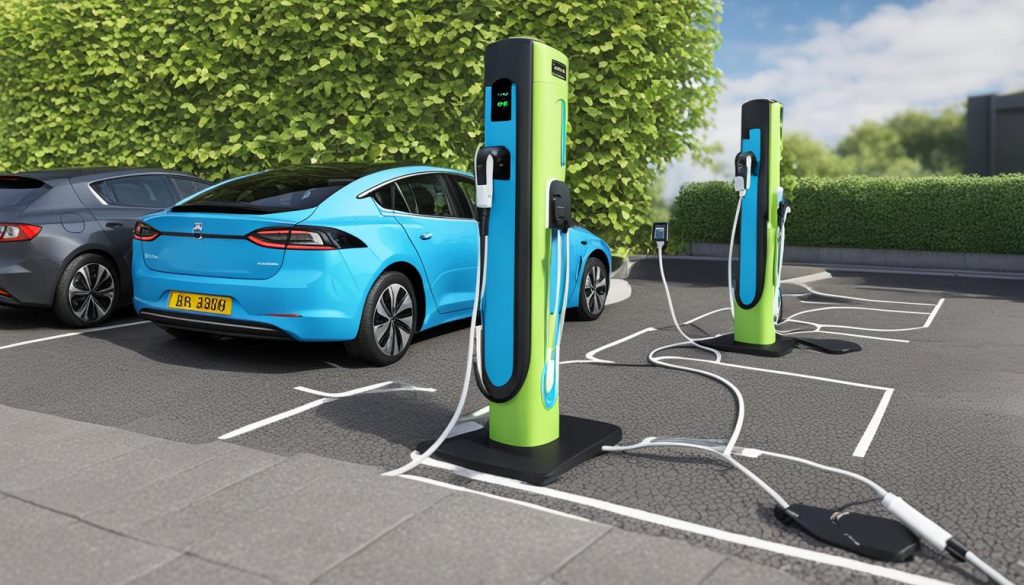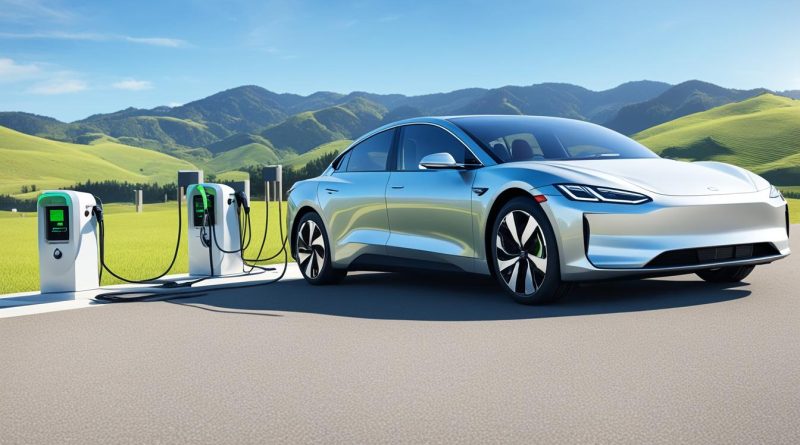Electric Vehicle Charging Guide for UK Drivers
Electric vehicles (EVs) are becoming an increasingly popular mode of transportation in the UK. With the rise of environmentally conscious consumers, more people are choosing to drive electric cars as a sustainable alternative to petrol or diesel vehicles. However, to make the most of their EVs, UK drivers need to have a good understanding of electric vehicle charging.
Electric vehicle charging, often abbreviated as EV charging or electric car charging, refers to the process of replenishing an EV’s battery using an external electric source. Unlike traditional petrol or diesel refuelling that takes a few minutes, EV charging takes longer, depending on the type of charger being used.
This guide will provide UK drivers with essential information on how to charge their electric vehicles efficiently and effectively, ensuring they get the most out of their driving experience.
Key Takeaways
- EV charging refers to the process of replenishing an EV’s battery using an external electric source.
- UK drivers need to have a good understanding of electric vehicle charging to make the most of their EVs.
- EV charging takes longer than traditional petrol or diesel refuelling.
- This guide provides UK drivers with essential information on how to charge their electric vehicles efficiently and effectively.
- By utilizing the information in this guide, UK drivers can contribute to a sustainable future.
Understanding Electric Vehicle Charging Infrastructure in the UK
Electric vehicle charging infrastructure plays a significant role in shaping the electric vehicle (EV) market and the future of sustainable transport. With the increasing demand for EVs, there has been a rapid expansion of the charging infrastructure across the UK. This section explores the different components of the infrastructure that are essential for understanding how to charge EVs efficiently.
Types of Electric Vehicle Charging Points
There are various types of electric vehicle charging points available in the UK, ranging from slow chargers to fast chargers. Slow chargers typically range from 3 to 7 kW and are suitable for overnight charging at homes or workplaces. On the other hand, fast chargers come in two varieties: 7 to 22 kW, which are ideal for public charging, and 22 kW to 50 kW, which are typically available in dedicated areas or motorway services. Figure 1 showcases the different types of electric charging points and their respective ratings.

It’s worth noting that the range of EVs is continuously improving, and as technology continues to advance, faster charging solutions will become available in future.
Electric Vehicle Charging Solutions
With the increasing demand for EVs, there has been a significant rise in the number of EV charging solutions providers in the UK. Besides the traditional charging point installation, some service providers offer smart solutions, such as intelligent load management, demand response services, and mobile apps that provide charging location and reservation capabilities. A reputable EV charging services provider is vital for ensuring reliable and efficient charging, as well as ensuring the safety of the user and the EV.
Choosing the Right Electric Vehicle Charging Services
As with any service or product, it’s important to choose reputable electric vehicle charging services providers to ensure safe chargers and reliable and efficient charging solutions. While many options are available in the market, choosing an established EV charging solutions provider with a proven track record is critical. One should look for providers that offer compliant EV charging solutions, certified by independent bodies and organisations, including OLEV. Additionally, EV charging services providers should provide suitable warranties and support for their products, and regular inspection and maintenance services should be available.
Exploring Electric Charging Stations for Convenient Charging
Electric charging stations are critical to the continued growth of the electric vehicle (EV) market, providing drivers with a reliable source of energy to power their vehicles. The UK has a growing network of electric charging stations that is continually expanding, ensuring that EV drivers have convenient access to charging wherever they are.
There are currently over 19,000 electric charging stations conveniently located throughout the UK, with approximately 35,000 connectors available to drivers, making it easy to find a charging station regardless of where you are driving. To find the nearest electric charging station, drivers can use a number of online tools and apps, including Zap-Map, Pod Point, and PlugShare. These tools provide real-time information on the availability and location of charging stations, making it easier for drivers to plan their journeys and recharge their vehicles as needed.
Strategic placement of electric charging stations is essential to ensure convenient access for UK drivers. These stations should be located in areas that are highly visible, easily accessible and in close proximity to amenities such as restaurants, shops, and businesses. Additionally, electric charging stations must be reliable, providing drivers with efficient charging solutions that do not require extended waiting periods or excessive maintenance costs.

As the popularity of electric vehicles continues to grow, it is essential to have a robust network of electric charging stations across the UK. With a focus on strategically located and reliable charging stations, the UK is working towards this goal, ensuring that EV drivers across the country have access to convenient charging solutions.
Conclusion
In conclusion, it is clear that electric vehicle charging is crucial for UK drivers seeking to reduce their carbon footprint and contribute to a sustainable future. By understanding the electric vehicle charging infrastructure in the UK, drivers can make informed decisions regarding charging solutions and service providers. Access to electric charging stations across the UK also ensures convenience and accessibility, allowing drivers to charge their electric vehicles efficiently.
It is important to note that as the popularity of electric vehicles continues to grow, so too will the demand for reliable and efficient charging services. As such, it is essential for service providers to continually invest in the development and maintenance of charging infrastructure and for UK drivers to prioritize reputable service providers.
Ultimately, efficient electric vehicle charging is a crucial component of the transition to a sustainable future, and UK drivers have an important role to play in this transition. By utilizing the information and resources provided in this guide, drivers can confidently navigate the electric vehicle charging landscape in the UK and make a positive impact on the environment.
FAQ
What is electric vehicle charging?
Electric vehicle charging refers to the process of replenishing the battery of an electric vehicle with electricity. It is a crucial aspect of owning and operating an electric car, as it allows drivers to harness renewable energy sources and reduce their carbon footprint.
How does electric vehicle charging infrastructure in the UK work?
The electric vehicle charging infrastructure in the UK consists of various components, including charging points, also known as electric vehicle chargers. These charging points can be installed in public locations, such as car parks and roadside charging stations, as well as in private residences.
What types of charging points are available in the UK?
There are different types of charging points available in the UK, ranging from slow chargers to fast chargers. Slow chargers typically take several hours to fully charge an electric vehicle, while fast chargers can charge a vehicle in a shorter period, usually within an hour or less.
Are there different charging solutions offered by service providers?
Yes, there are various charging solutions offered by service providers in the UK. These solutions may include subscription-based services, pay-as-you-go options, or membership programs that provide access to a network of charging points across the country.
How can I find electric charging stations in the UK?
Electric charging stations in the UK can be found using various methods. Many service providers have their own smartphone apps or online platforms that provide real-time information on the availability and location of charging stations. Additionally, mapping services like Google Maps often include charging station locations.
Why is the strategic placement of charging stations important?
Strategic placement of charging stations is essential to ensure convenient access for UK drivers. By strategically locating charging stations, they can be easily accessed during long journeys or daily commutes, providing peace of mind and encouraging the adoption of electric vehicles.
Why is effective electric vehicle charging important for UK drivers?
Effective electric vehicle charging is vital for UK drivers to maximize the range and efficiency of their electric vehicles. By utilizing reliable charging solutions and accessing convenient charging stations, drivers can safely and efficiently power their vehicles, contributing to a sustainable future.




